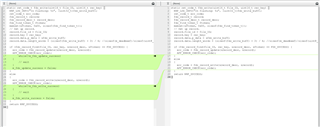Hello to all,
I am using nRF52832 DK with sd132, v6.0.0 and sdk 15.0.0, segger embedded studio. We want to achieve change application timer time (APP_TIMER_TICKS(update_time)) using android phone. We have a sensor devices it will wake up as per app timer time defined, we want to change this wake up time using Noridc UART tool box app. For that we are using fds example as referred in given sdk 15.0 and other nRF5-flash-storage-examples .
We are able to flash write read and delete but problem is:
- When i call fds_test_find_and_delete(), fds_test_write(), fds_read() whenever received command from nordic UART app it not able to read and write at this time.
- I want to change update_time variable of app timer ticks using android phone and store this time in flash. Whenever want to user need to change this time first delete previous and update latest send time.
- Will you please provide me program snippet for How i call flash fds API through android phone and store received time in that app_timer ticks. Confused regarding this.
I am currently using this following functions for FDS read, write, and delete:
static ret_code_t fds_test_write(void)
{
//static uint32_t const m_deadbeef[2] = {0xDEADBEEF,0xBAADF00D};
static uint8_t const m_deadbeef[1] = {0x14};
// memcpy(m_deadbeef, write_data, sizeof(m_deadbeef));
fds_record_t record;
fds_record_desc_t record_desc;
// Set up data.
// Set up record.
record.file_id = FILE_ID_FDS_TEST;
record.key = REC_KEY_FDS_TEST;
record.data.p_data = &m_deadbeef;
//record.data.length_words = sizeof(m_deadbeef)/sizeof(uint32_t);
record.data.length_words = sizeof(m_deadbeef)/sizeof(uint8_t);
ret_code_t ret = fds_record_write(&record_desc, &record);
if (ret != FDS_SUCCESS)
{
return ret;
}
NRF_LOG_INFO("Writing Record ID = %d \r\n",record_desc.record_id);
return NRF_SUCCESS;
}
static ret_code_t fds_read(void)
{
fds_flash_record_t flash_record;
fds_record_desc_t record_desc;
fds_find_token_t ftok ={0};//Important, make sure you zero init the ftok token
//uint32_t *data;
uint8_t *data;
uint32_t err_code;
NRF_LOG_INFO("Start searching... \r\n");
// Loop until all records with the given key and file ID have been found.
while (fds_record_find(FILE_ID_FDS_TEST, REC_KEY_FDS_TEST, &record_desc, &ftok) == FDS_SUCCESS)
{
err_code = fds_record_open(&record_desc, &flash_record);
if ( err_code != FDS_SUCCESS)
{
return err_code;
}
NRF_LOG_INFO("Found Record ID = %d\r\n",record_desc.record_id);
NRF_LOG_INFO("Data = ");
//data = (uint32_t *) flash_record.p_data;
data = (uint8_t *) flash_record.p_data;
for (uint8_t i=0;i<flash_record.p_header->length_words;i++)
{
NRF_LOG_INFO("0x%8x ",data[i]);
}
NRF_LOG_INFO("\r\n");
// Access the record through the flash_record structure.
// Close the record when done.
err_code = fds_record_close(&record_desc);
if (err_code != FDS_SUCCESS)
{
return err_code;
}
}
return NRF_SUCCESS;
}
static ret_code_t fds_test_find_and_delete (void)
{
fds_record_desc_t record_desc;
fds_find_token_t ftok;
ftok.page=0;
ftok.p_addr=NULL;
// Loop and find records with same ID and rec key and mark them as deleted.
while (fds_record_find(FILE_ID_FDS_TEST, REC_KEY_FDS_TEST, &record_desc, &ftok) == FDS_SUCCESS)
{
fds_record_delete(&record_desc);
NRF_LOG_INFO("Deleted record ID: %d \r\n",record_desc.record_id);
}
// call the garbage collector to empty them, don't need to do this all the time, this is just for demonstration
ret_code_t ret = fds_gc();
if (ret != FDS_SUCCESS)
{
return ret;
}
return NRF_SUCCESS;
}



